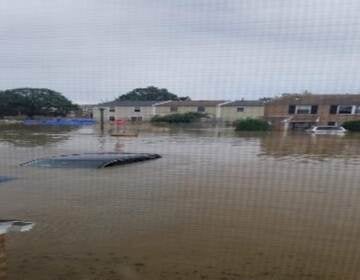Inquirer: A “green” city plan to reduce storm water runoff
Inquirer: A “green” city plan to reduce storm water runoff
Storm water is nasty and dirty and can cause flooding. So the sooner it gets off a property, the better.
But it’s about to become valuable stuff in Philadelphia. Businesses can make money by embracing it. Or face losing money if they let it go.
This week, the Water Department is sending notices to 79,000 commercial customers about a new billing structure for storm water that will begin in July.
As always, there will be winners and losers.
By the end of a four-year phase-in period, at least 1,500 customers could see an increase of $500 or more a month in their bills, said Joanne Dahme, public affairs manager for the department’s Office of Watersheds.
About three dozen unlucky customers could see hikes of more than $10,000 a month.
But the program isn’t just a stick. As a carrot, it’s offering discounts for those who reduce runoff.
The program will not affect residential customers.
Currently, storm-water charges are embedded in sewer bills, which are based on water use.
But everyone knew this wasn’t fair. It didn’t account for storm water’s gushing from a site into the sanitary-sewer system – which costs the city more than $100 million a year to maintain.
Plus, 40,000 city properties that have no water meter – vacant lots, parking lots, and utility rights-of-way – get sewer service for their storm-water runoff for free.
Now the city is factoring in storm water not only as a way to make billing fair, but also to encourage ways to reduce the flow every time it rains.
It’s separating out the storm-water charge and basing it on the size of the property plus the amount of “impervious” surface, which prevents the absorption of rain into the ground.
The potential losers are those with low water use, and thus low bills now, but big roofs or parking lots.
Philadelphia International Airport – at nearly 700 acres, more than half sealed off by runways, parking lots, and roofs – tops the list.
Its monthly bill could triple from $53,000 to nearly $180,000 by the end of the phase-in, the city estimates.
Customers with smaller sites and large water use – hospitals, high-rises, and chemical companies, for instance – could see their bills decrease.
According to initial calculations, the Hospital of the University of Pennsylvania tops that list, with its monthly bill set to shrink from nearly $14,000 to less than $2,500.
But all this can change, Dahme said. Businesses can reduce their bills by installing retention basins, green roofs, and porous pavement.
So while airport chief executive officer Mark Gale said he was “very concerned about the financial impact,” changes are already in the works.
WHYY is your source for fact-based, in-depth journalism and information. As a nonprofit organization, we rely on financial support from readers like you. Please give today.





